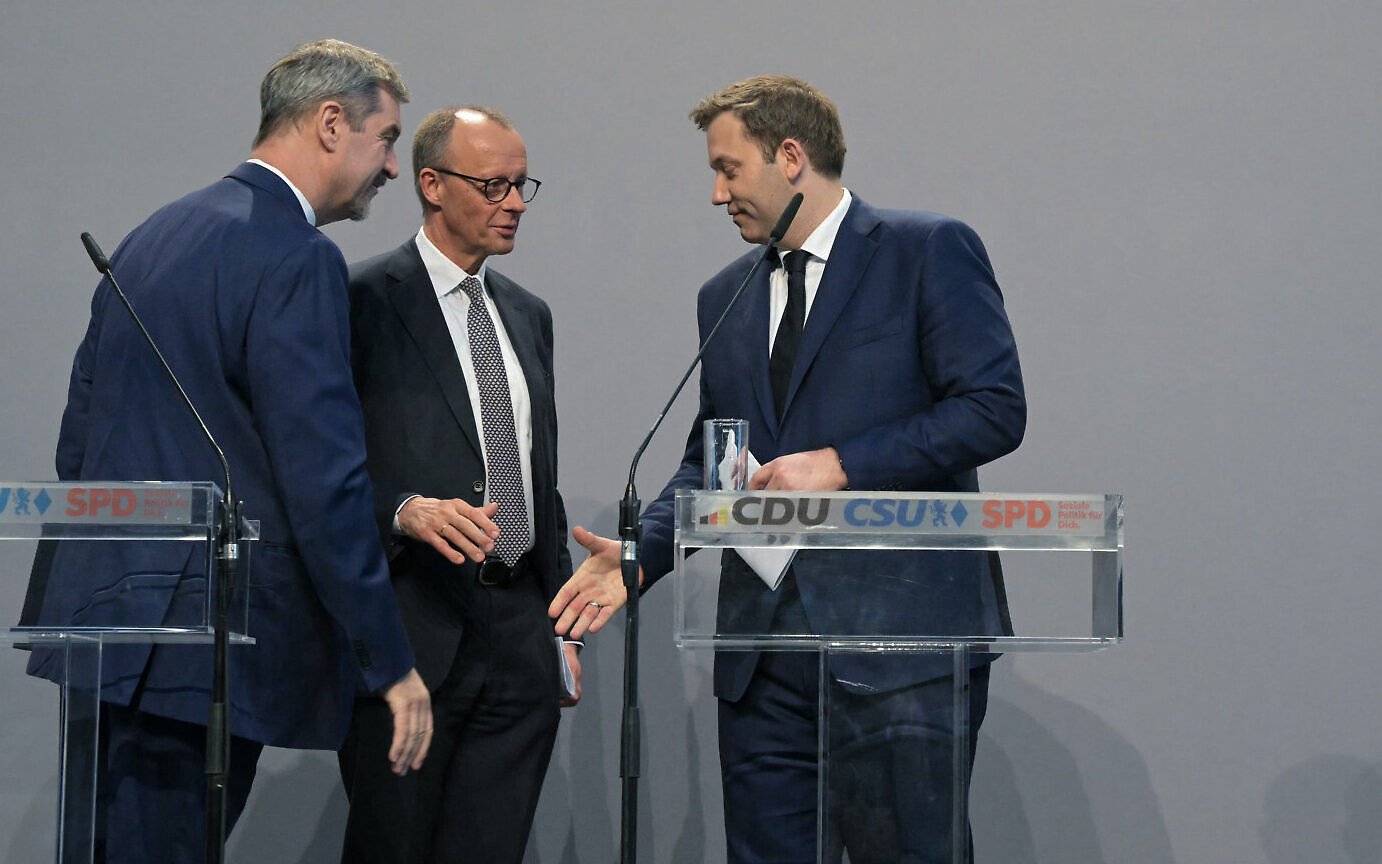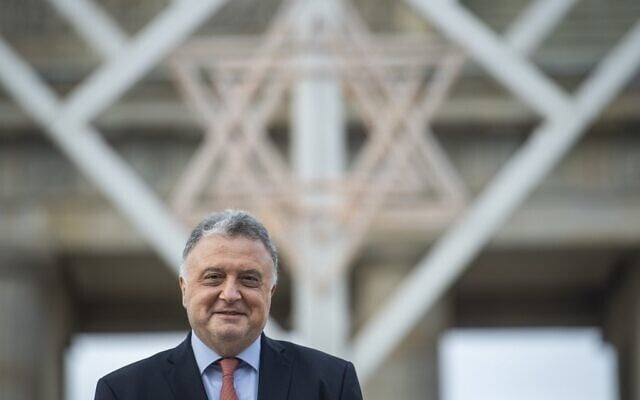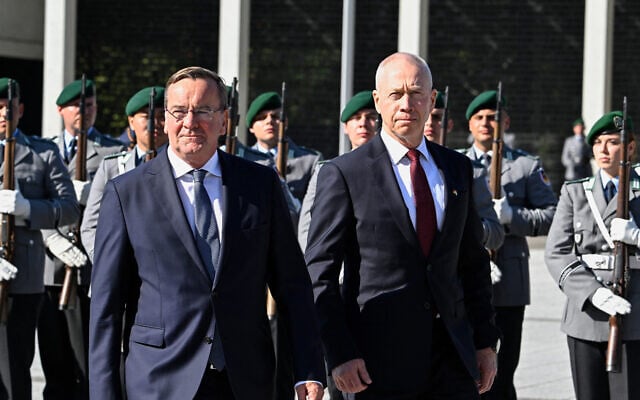



DÜSSELDORF, Germany — German election winner Friedrich Merz sealed a deal Wednesday to form a new government bringing together his conservative Christian Democratic Union-led bloc and the center-left Social Democrats, after accelerated negotiations reportedly driven by concerns over US trade tariffs and gaining far-right popularity.
The deal aims to spur economic growth, ramp up defense spending, take a tougher approach to migration and catch up on long-neglected modernization, but behind the agreement lie policy divisions between the factions that could impact the future of Germany’s relationship with Israel, including military exports and funding for the UN agency for Palestinian refugees, UNRWA.
Before Merz can take the helm, the coalition deal needs approval in a ballot of the Social Democrats’ membership and by a convention on April 28 of Merz’s CDU, which ran in a joint bloc with the Christian Social Union party in Germany’s February 23 election.
That election marked a significant rightward shift for the European Union’s most populous country, with the far-right Alternative for Germany, or AfD, coming in second place with over 20 percent of the vote. The results left Merz with little choice but to deal with the Social Democrats, or SPD. He ruled out an alliance with the AfD, citing its ties to right-wing extremism, antisemitism, and racism.
Recent polls showed the AfD gaining on CDU/CSU as talks dragged on, adding impetus for Merz to clinch an agreement quickly even if it meant papering over policy differences with SPD.
Both the CDU/CSU and SPD have traditionally maintained support for Israel, though the latter has been more critical of Israeli government policies.
“Historically, certain factions within the SPD have been more supportive of the Palestinian cause and have taken a more critical stance toward Israel, particularly regarding its right-wing to far-right government,” said Prof. Stephan Marschall, a senior political scientist at Heinrich Heine University. “On the other hand, [CDU/CSU] traditionally has aligned more closely with Israel’s security concerns.”
Experts warn that recent trends could widen that wedge, exacerbating tensions between Jerusalem and Berlin.
“The fragile situation in Gaza, coupled with Israel’s ongoing settlement policy, could reinforce the SPD’s critical stance toward the Israeli government and its actions,” he told The Times of Israel. “This perspective challenges Germany’s traditionally strong and largely unconditional support for Israel, prompting debates over whether Berlin should adopt a more nuanced approach.”
During negotiations, which had initially been slated to wrap up sometime after Easter, one of the most contentious issues between the parties regarded proposed reforms to Germany’s military export policy toward Israel.
Currently, arms sales must be approved by the Federal Security Council, but CDU/CSU had sought to remove the hurdle as it pursues a relationship in which Israel’s security is a German “reason of state,” a term used to denote Berlin’s special commitment to Israel in the wake of the Holocaust.
“Lifting export restrictions on arms deliveries to Israel for self-defense could have resulted in much stronger military support,” Marschall said.
However, the SPD rejected the changes, insisting that military exports should remain subject to strict oversight, which some saw as a reflection of its reluctance to arm the Jewish state. In 2024, Merz accused Germany’s SPD-led government of halting arms exports to Israel.
Though former chancellor Olaf Scholz denied any such policy, government data showed that arms exports to Israel fell by half from 2023 to 2024 and the reported halt in weapons sales fueled unease regarding SPD’s leadership among many in Germany’s Jewish community.
“In terms of what we expected from Germany, there was quite a bit of disappointment, this included the UN votes, the secret embargo [on arms sales], and many other steps that disappointed people,” said Jacob Horowitz, a former board member of the Jewish Student Union of Germany.
The coalition agreement sealed Wednesday omits any mention of reforms to defense exports, indicating that Federal Security Council oversight will remain in place.
However, Jeremy Issacharoff, a former Israeli ambassador to Germany, signaled confidence that defense trade between the countries would remain strong.
“Agreements on major defense projects, such as the procurement of Arrow 3 from Israel and submarines from Germany, will likely continue,” he said.
The sides had also sparred over funding for UNRWA, which provides humanitarian aid and other services to Palestinian refugees in Jerusalem, the West Bank, Gaza, Jordan, Syria and Lebanon.
In 2023, Germany was the second largest donor to the agency behind the US, sending it over $200 million. In January 2024, Berlin joined others in suspending aid after Israel published evidence showing that several UNRWA employees had taken part in the October 7, 2023, Hamas attack, but restored the funding months later.
The SPD has supported continuing funding for UNRWA and even condemned Israel’s decision to pass laws banning attempting to curtail the agency’s activities in the West Bank and Gaza. But the CDU/CSU has raised concerns about keeping the spigot on, citing the UN agency’s alleged antisemitism and links to the Hamas terror group.
Wednesday’s agreement contains something of a compromise on the issue, conditioning future support on “comprehensive reforms,” but leaving significant room for ambiguity on what those reforms may entail.
Marschall predicted that Germany’s support for UNRWA would likely remain unchanged under Merz.
“Germany had a strong commitment to multilateralism and the role of the United Nations, which suggested that, despite the discussion, support for UNRWA was unlikely to be fully withdrawn,” he said.
Issacharoff emphasized that both parties are committed to Israel’s security, in official positions repeatedly voiced by their leaders.
But he warned that ties could fray in response to actions by Prime Minister Benjamin Netanyahu’s right-wing government, should it pursue moves that undermine a two-state solution to the Israeli-Palestinian conflict, such as advocating for the annexation of Gaza or expanding Israeli authority in the West Bank
Such tensions, he noted, “could… create significant challenges for the new German chancellor.”
The coalition agreement includes a commitment to continue pushing for Palestinian statehood, which had been a central SPD demand.
“The viable perspective for peaceful coexistence between Israelis and Palestinians is a negotiated two-state solution,” the text reads.
Responsibility for Germany’s foreign affairs will fall to the CDU; both candidates for foreign minister are considered to have strong pro-Israel records. SPD’s Boris Pistorius, also considered a strong friend of Israel, will stay on in his role as Germany’s defense chief.
The CDU’s hold on the Foreign Ministry will likely be viewed as good news for Netanyahu.
On February 24, a day after coming in first place in the election, Merz sparked controversy by inviting Netanyahu to Germany, publicly stating that the prime minister would not be arrested despite a warrant issued by the International Criminal Court on war crimes charges related to the fighting in Gaza.
Following the invite, SPD leaders and other politicians accused Merz of disregarding international law, another point of contention in the coalition talks.
“Respect for international law is a key concern for all parties involved in the coalition talks and has been explicitly emphasized in the draft version of the coalition agreement—especially at a time when a major democratic global power such as the United States has questioned aspects of international law,” Marschall said. “Regarding the Middle East, the central debate is about whether, and to what extent, the Israeli government is violating international law.”
What remains to be seen is to what extent the coalition agreement will actually guide German policy toward Israel, especially on particularly sticky issues like settlements and the war in Gaza.
In these cases, compromise was reached by “softening the language in the final agreement while maintaining key buzzwords,” said Marschall. “This allowed both sides to uphold their positions without jeopardizing the broader coalition negotiations.”
The Associated Press contributed to this report.








